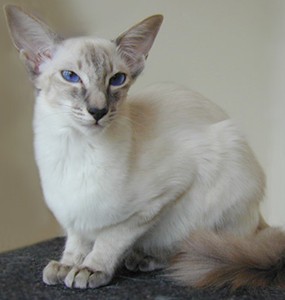Background
The Balinese is a breed of domestic cat which has semi-long hair and ears similar to those of a Siamese cat. This breed is also sometimes referred to as a “longhaired Siamese.” Some theories have it linked not only to the Siamese breed, but also to the Angora and Persian breeds of the 1920’s.
Contrary to popular belief, the Balinese is not actually native to Bali or any part of Indonesia. In fact, they aren’t native anywhere and are likely the result a mutation and extensive breeding efforts. Because of its lack of historic background the very first appearance is unknown, but we do know the first breeding program began in the 1950’s.
In 1979, the Balinese was recognized by the International Cat Association.
Cat Facts
- Talk about a “chatty-Cathy!” These cats are highly vocal.
- The Balinese comes in the same colors as a Siamese; seal, lilac, chocolate, and blue.
- The average weight of a healthy Balinese is between 5 and 9 lbs.
- They can live up to 15 years.
- The Balinese has a muscular body and blue eyes.
- The Balinese is rated the highest in intelligence of all the long-haired breeds.
What are they like?
The Balinese are adaptable, outgoing, energetic, intelligent, and loyal. Those are only a few adjectives to describe this magical creature.
This breed is typically healthy but some health issues may include:
- Lysosomal Storage Diseases
- Feline Acromelanism
Right for you?
- Natural Helpers: They love to learn and love to be around to help you with whatever you’re doing, even if it’s reading a book…
- Fast Learners: Because they’re always following you, they pick up things quick which makes them quite easy to train. Easy enough to walk on a leash!
- Extreme Extroverts: These cats get along with everyone; adults, kids, other cats, and even dogs!
- Very little Grooming: Because of the Balinese’s silky coat, it hardly sheds, if at all. A weekly brushing will please him greatly. Weekly nail trimming and ear cleaning are also advised.
If you have any questions or concerns, you should always visit or call your veterinarian – they are your best resource to ensure the health and well-being of your pets.
